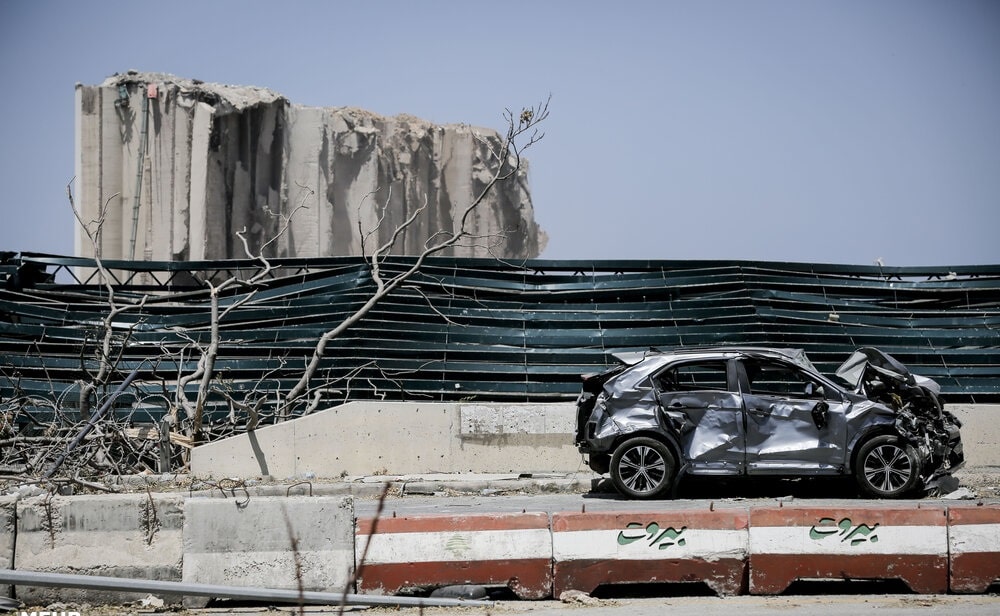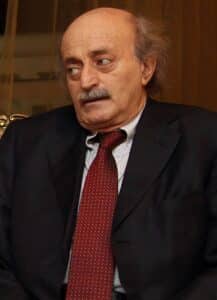Damages after 2020 Beirut explosions: Mehr News Agency CC BY4.0
On January 25, Lebanon´s chief prosecutor, Ghassan Oweidat, defied the judge leading the investigation into Beirut’s 2020 port blast, claiming he mishandled the inquiry and that he cannot proceed with the investigation until the country’s juridical authorities rule on the matter. He also ordered the release of all suspects in the investigation into the explosion. This was a reaction to the announced investigation by the judge, Tarek Bitar, into Oweidat himself and other powerful Lebanese politicians. This announcement was a surprise because of the 13-month suspension due to legal complaints and high-level political pressure. Ghassan Oweidat made another statement saying that the judiciary should not accept any orders, warrant or other documents issued by Bitar. He also cancelled the meeting of the Supreme Judicial Council to discuss the future of the blast inquiry due to protest, but did not set a time or date for a new session.
Obstruction of investigation continues
The investigation into the Beirut’s explosion has been repeatedly stalled by political interference. Bitar’s predecessor was removed from office in early 2021 after political pressure. Bitar then began new investigations into politicians and officials he linked to the explosion. These were obstructed by numerous complaints filed by politicians questioned by Bitar. As a result, the investigation was at a standstill for thirteen months as the hearing of the complaints kept being postponed and the judges who were supposed to rule on them retired. The authorities have not appointed new judges to resume its work. Nevertheless, Bitar started the investigation again last week, stating that only the minister of justice or the supreme court have the power to remove him from the case. He added that the prosecutor had no right to file a charge or release detainees because Oweidat himself had been charged over the explosion.
There has been a systemic attempt by the establishment to protect its members from the port blast. The explosion was caused by hundreds of tons of improperly stored ammonium nitrate that had been unloaded at the port in 2013. The then president, prime minister and other officials knew about it and allowed the ammonium nitrate to linger in the port for six years. Numerous officials and ministers were aware of the threatening situation, but did not intervene despite numerous warning. They all deny all allegations against them.
Economic and political crises
Lebanon has been in a political and economic crisis. Lebanese emphasized that the financial meltdown is caused by mismanagement of the country’s ruling elite since 2019 and decades of corruption. According to AP News, ruling politicians have so far done little to address the crises and are putting vested interests above reform. The currency of the Lebanese pound decreased even more as the parliament failed for an eleventh time to agree on a new president. In October, president Michel Aoun left after six years without a replacement. The country is also ruled by a ‘caretaker’ government after the prime minister failed to form a cabinet. Politicians have been unsuccessful in agreeing on the shape of a new cabinet, which means that the current regime lacks full constitutional decision making powers, due to its caretaker status. It has become even more complicated since there is no president, whose signature is required to install any new coalition. Fractious political parties have found no consensus on any candidate.
This political crises is feared to further delay efforts to reach an agreement with the International Monetary Fund (IMF). That deal would provide Lebanon with 3$ billion in assistance, which is seen as an important step to help the country overcome the crises that has left three-quarters of the population living in poverty. However to get access to the fund, major reforms have to be implemented which are currently blocked and obstructed by the political establishment.
The tensions are rising in Lebanon. More than 200 people protested last week over efforts to derail an investigation into the deadly 2020 Beirut port explosion. They demanded that Bitar should be allowed to carry on the investigation. Many Lebanese see the port disaster as the visualization of the corruption, mismanagement and unaccountability of a ruling elite that also steered Lebanon into a devastating financial collapse. For the Lebanese, there is not a lot of prospect. The government is not implementing the necessary reforms to get access to the fund of the IMF, which is seen as necessary to rebuilt the economy. There are also no clear candidates for presidency who the government will agree on because the Hezbollah movement nor its opponents have a clear majority in the current government. Without a president, there is not even a possibility to form a coalition.
Author: Manouk Bronzwaer



